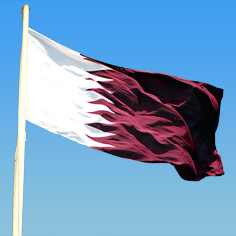The sudden political withdrawal of Qatar from the international scene was followed, a week later, by the overthrow of Mohamed Morsi in Egypt. Although these two events coincided, without cause and effect, their occurrence has radically changed the future of the Arab world.
Within two weeks, the Muslim Brotherhood, to which Washington was promising the leadership of the Arab world, have lost two of their main levers of power. Emir Hamad Al-Thani of Qatar was forced to abdicate on June 25th and with him his mentor and Prime Minister, HBJ. On July 3rd, President Mohamed Morsi was toppled by the Egyptian Army, while warrants were soon issued for the arrest of the main figures of the Egyptian movement, including the Supreme Guide of the Brotherhood, Mohammed Badie.It does not appear that, in pushing Emir Hamad towards the exit, Washington had anticipated another regime change in Egypt. The United States, which did not tolerate its political and financial shenanigans, decided to relegate Qatar to its rightful place as a micro-state. Washington did not question the assistance provided by the Emir to the Muslim Brotherhood, nor their role in Cairo, just the flamboyance of the emirate.
The role of the Brothers
In any case, the unexpected legal accession of the Brotherhood to power in Egypt, in June of 2012, foreshadowed the real purpose of the “Arab Spring“: to usher in a new era of colonization based on the secret deal between the Brothers, the United States and Israel. For the Brotherhood, the forced Islamization of North Africa and the Levant; for Washington, economic globalization, including massive privatization; and for Tel Aviv, the continuation of the separate Camp David peace.
It is important to understand that, as a consequence, “The Brotherhood has become the spearhead of Arab Zionism“, in the words of Lebanese thinker Hassan Hamade. This is confirmed, in his own way, by the “spiritual adviser” of Qatar’s Al-Jazeera, Sheikh Yusuf al-Qaradawi, when he preaches that if Muhammad were alive today, he would live in peace with the Israelis and he would support NATO.
The ideology of the Brotherhood
This stance was facilitated by the structure of the Muslim Brotherhood. Although it is coordinated internationally, the Brotherhood does not consist of a single organization, but of a multitude of distinct groups. In addition, there are different levels of membership, each with its own ideology. However, all rally around the same motto: “Allah is our goal, the Koran is our law, the Prophet our leader, Jihad our way and martyrdom our highest hope.” In addition, they all adhere to the teachings of Hassan al-Banna (1906-1949) and Said Qutb (1906-1966).
De facto, the Brotherhood is the matrix of all the Salafist movements (i.e., trying to emulate the companions of the Prophet) and Takfirist groups (i.e., fighting against the apostates) working with the CIA. Thus Ayman al-Zawahari, current leader of al-Qaeda, emerged from their ranks. A loyal U.S. agent, he instigated Hosni Mubarak’s ascendance to power by organizing the assassination of Anwar Sadat. He has now become the spiritual leader of the Syrian Contras.
The Brotherhood has always been a minority in all countries where it has developed, including in Egypt, where it owes its election victory at the polls solely to a boycot by two thirds of the population. It has therefore fomented, against dictatorships, all kinds of armed groups who tried to seize power by force or dissimulation. What characterizes its behavior is its creed that “The end justifies the means.” Therefore, it is difficult to distinguish within its ideological evolution, that which is authentic from that which springs from political seduction. Specifically, the Egyptian case showed that its democratic evolution was pure facade, just for the time of an election.
Above all —although initially a movement to fight against British imperialism— it came immediately into conflict with Arab nationalism, the main opponent of imperialism in the region. Understanding the use they could make of the Brothers, the British experts in handling sects, far from eliminating them, penetrated and sustained them to fight against the nationalists. Today still, the international coordination of the Brothers is based in London.
The “Arab Spring” (since December, 2010) is basically a revival of the old Franco-British “Arab Revolt” strategy against the Ottomans (1916-1918). Except this time, the goal was not to put pseudo-independent puppets in the place of the old Ottoman administration, but to replace worn-out allies with virgin and globalization-friendly puppets.
Qatar’s strategic retreat
Since the team change in Qatar, money stopped flowing freely to the Brothers, whether in Syria, Palestine, Egypt, Libya or elsewhere. The emirate is focusing on its domestic ambitions and plans to spend $ 200 billion to prepare for the World Cup in five years.
This sudden disappearance from the international scene has left the field open to the Saudis and Emiratis, both of which rushed in to support the new Egyptian regime.
On the other hand, the rivalry between Qatar and Saudi Arabia has led Iran to support Mohamed Morsi in Egypt while supporting Bashar al-Assad in Syria. Thus, Tehran found itself having more affinity with the Egyptian Brotherhood Project “to Islamize society” than with that of the Nasserists to liberate Palestine from colonial occupation.
Ultimately, the withdrawal of Qatar implies a rebalancing of forces in the Anglo-American world. Subsequently, the control commissions of the secret services of the United States Congress and of the British House of Commons opposed the sending of arms to the “rebels” in Syria.
The fall of the Muslim Brotherhood is not only a failure of the Brotherhood, but also a failure of those in London and Washington who thought they could reshape North Africa and the Middle East, and, failing that, prefer to allow chaos to reign rather than lose control.
Translation
Roger Lagassé
